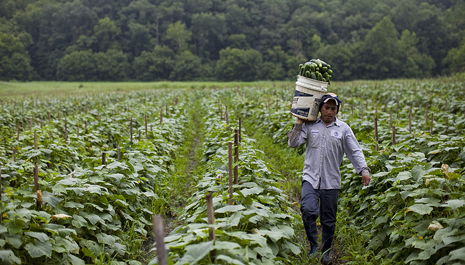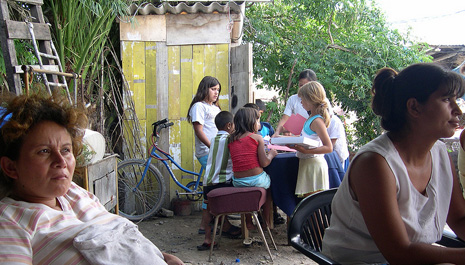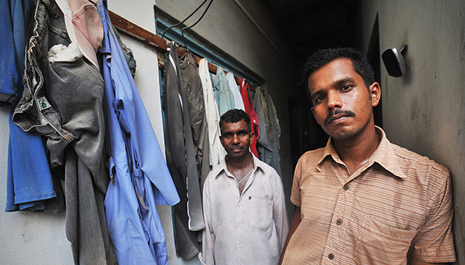Human and Labour Rights
(Research papers and policy briefs below)
The rule of law and respect for widely recognized notions of human rights are the essential foundation for democratic society and social cohesion. Respect for the human rights of all persons in each society is an essential, accountable and equitable basis for addressing and resolving differences, tensions, and potential conflicts that interaction among different persons and groups with different interests inevitably brings, particularly in context of immigration and the diversity it brings.
ILO pioneered the development of international instruments pertaining to migrant workers in its Conventions on Migration for Employment, 1949 (No.97) and the Migrant Workers (Supplementary Provisions), 1975 (No.143). In addition all ILO labour standards apply to migrant workers in the workplace unless otherwise specified. A long and slow trend extending application of basic human rights principles elaborated in the 1948 Universal Declaration of Human Rights to migrants culminated in the adoption of the 1990 International Convention on the Protection of the Rights of All Migrant Workers and Members of Their Families. Discussion of migrants' human rights became markedly more visible and "mainstream" over the last decade. Migrants rights has emerged as a formal topic on the agenda of many migration-related conferences and forums, and news media attention increased. A global campaign for ratification of the Conventions on migrant workers helped obtain 56 States Parties to the ICRMW (plus 12 signatories pending ratification) and a total of 93 countries that have ratified at least one of the three international Conventions on migrants (as of mid-2022).
However, contemporary international forums on migration appear dominated by views that overlook these international standards as irrelevant, while relegating participation of civil society and the United Nations to the margins. This should be seen in a context where there is rampant abuse and exploitation of rights of migrant workers in all regions of the world. Research, documentation and analysis of the nature and situation of human rights issues of migrants remain inadequate. International efforts to defend human rights of migrants and combat xenophobia remain scattered and fragmented. The few activities by UN and other inter-governmental organizations to promote standards and their implementation have been resource-starved. While migrant and civil society organizations active on migrants rights emerged in Asia, the Americas and Europe, there is still little coherency in international civil society efforts.
Advancing the protection of migrants' human rights requires common approaches, strategies, and coordination as well as mobilization of human resources. Government officials and institutions, social partners, , civil society and migrant groups all have roles to play in cooperation at national regional and international levels for this purpose. GMPA offers research capacity, technical expertise and successful experience in assisting governments and other stakeholders to adopt and apply international standards and implement effective practical measures to ensure protection of migrants and effective governance of migration in line with the ILO and UN instruments and the ILO Multilateral Framework on Labour Migration.
Documents and Papers
- Migration means social justice, inclusion, equality of treatment and health for all, P. Taran, 2023.
- Ratifications of international instruments on migration / migrants rights (ILO C97 & C-143, ICRMW), updated 15 November 2022
- Migration, Human Rights & Sustainable Economies: A Century 21 Agenda. P. Taran (2022), Revista Tecnológica - Espol.
- Migrant workers and discrimination: realities, threats, and remedies. A.Gächter (2022), Revista Tecnológica - Espol
- La Pandemia de Covid y Los Migrantes: una Agenda de Diez Puntos Para Mitigar el Desastre en Curso. P. Taran & N. Solorzano Alcivar (2021).
- Malaysia: Review of admission and recruitment practices of Indonesian workers in the plantation and domestic work sectors and related recommendations. P.Wickramasekara, ILO, 2020.
- Language, Survival of Minority and Indigenous Peoples, and Measures for Recognition, Preservation, Teaching and Usage of Languages. P.Taran, 2019.
- Accession with low compliance: Sri Lanka’s experience with the 1990 International Convention on Migrant Workers. P.Wickramasekara, 2019.
- Effective return and reintegration of migrant workers with special focus on ASEAN Member States. P.Wickramasekara, ILO, 2019.
- Migration-Health-HIV&AIDS Framework for Action Brief 2019
- Core elements of a bilateral agreement or a memorandum of understanding on labour migration. P.Wickramasekara, ILO, 2018.
- Assessment guide for bilateral agreements and memoranda of understanding on labour migration with special focus on Bangladesh. P.Wickramasekara, ILO, 2018.
- Good Practices and Provisions in Multilateral and Bilateral Labour Agreements and Memoranda of Understanding. P.Wickramasekara, ILO, 2018.
- The primacy of city/local governance on migration: challenges and ways forward. P.Taran and O.Kadysheva, 2018.
- Regional mobility, freedom of movement and integration: integral to sustainable development and governance worldwide; Contemporary political-economic challenges, contentions and responses. Taran, 2018.
- Migration, development and governance: labour and skills mobility, international standards and comprehensive migration policy for Taiwan. Taran, 2018.
- Migrant Women, Women Migrant Workers. Crucial challenges for advocacy, services and action. Taran, 2018.
- Migration, Development, Integration & Human Rights: Global Challenges in the 21st Century. Taran, 2018.
- Promoting a Rights-based Approach to Migration, Health, and HIV and AIDS: A Framework for Action. ILO, 2017. Researched and written by P.Taran with GMPA team.
- Cities welcoming refugees and migrants: enhancing effective urban governance in an age of migration. UNESCO-ECCAR-GMPA, 2016.
- Migrant Women, Women Migrant Workers: Crucial Challenges for Rights-based Action and Advocacy. Taran, 2016.
- Migrants and Refugees Have Rights Caritas Europa, 2015, researched and written by GMPA team
- Handbook for Parliamentarians: Migration, Human Rights and Governance. IPU-ILO-OHCHR, 2015
- Venice EIUC Seminar on ICRMW: Migrant Rights, International Conventions and the Rights Based Approach under Assault, TARAN, 2014.
- International Migration, Human Rights, Development and Governance: Current State of Affairs: A Global Overview, TARAN, 2014.
- The Rights of Children, Youth and Women in the Context of Migration, CERIANI, ABRAMOVICH & MORLACHETTI, 2011.
- Migration, Globalization and Protection: A Perspective for Public Service in Defense of Human Rights and Dignity, TARAN, 2010.
- European Migration Control in the African Territory: the Omission of the Extraterritorial Character of Human Rights Obligations, CERIANI, 2009.
- Migrant Workers Rights in Europe: Issues and Challenges, TARAN, 2009.
- Migration and Deportation in West Africa, Chapter 3: Migrant Rights and Migration Control Policies in the Jurisprudence of the European Court of Human Rights: Challenges, Obstacles and Opportunities for Litigation, CERIANI, 2008.
- Globalization, International Labour Migration and Rights of Migrant Workers, WICKRAMASEKARA, 2006.
- Are Migrant Worker's Rights Human Rights? Hoffman Plastics v NLRB and the Sovereign Power to Discriminate under International Law, SIMEONE, 2005.
- Migration, Globalization and Human Rights: New Challenges for Africa, TARAN, 1999.





